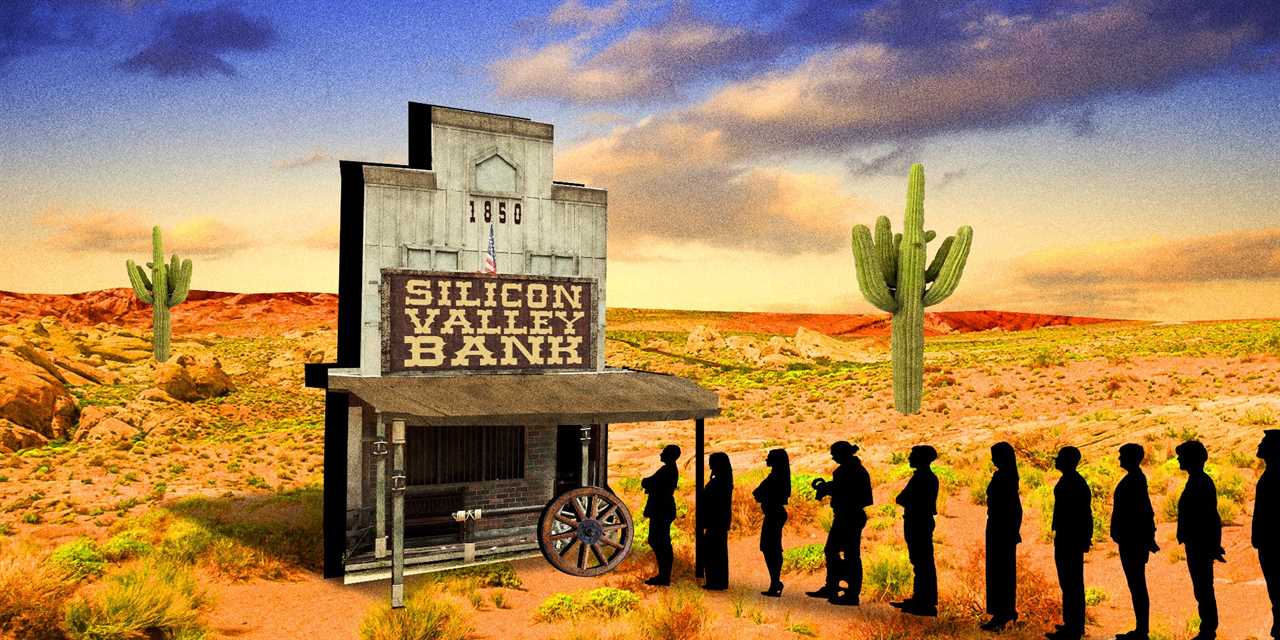
Witthaya, aoldman / Getty Images; Arif Qazi / Insider
From Manifest Destiny to Big Tech, Silicon Valley Bank is a case study in the how the West was spun
As Silicon Valley Bank went down the tubes, it wasn't surprising that the loudest mouths in Techworld started demanding that the federal government cover everyone's losses. When capitalism goes kersplat, even the most libertarian Peter Thiel adherents turn into New Dealers. Sure, they like to mock colleges as "woke madrassas" and condemn student-loan forgiveness as a moral hazard. But when it's their money on the line, they're all for privatizing the profits and socializing the losses. It's a robber-baron classic.
But because the bankers in question here saw themselves as innovating the way startups get funded, their bleating for government aid actually comes from a whole other wellspring. They were pioneers on the frontier of tech and finance, and as such they acted the way pioneers always do. After declaring themselves ungovernable — mavericks too free-spirited to be shackled to polite society — they headed into the wilderness to live off nothing but their rugged individualism. Then they got massacred and came running back to Fort Washington, demanding that the people in charge expand the boundaries of the camp outward to protect their precarious settlements. This cycle of bold sowing and whiny reaping is how the West was won.
In SVB's case, the argument went something like this: Silicon Valley Bank was different from other, stodgy banks, in part because it was too small to warrant the kind of regulatory oversight that resulted from the 2008 financial crash, and in part because it was too critical to the fast-moving disruptive world of startups and venture capital. Bureaucratic interference would just keep everyone from building value. Ungovernable!
That's what SVB's boss Greg Becker argued, and he got what he wanted. The bank was allowed to move outside the government's protection, taking on way more financial risk than regulators ought to permit and accepting massive, uninsured cash deposits from flush startups. Then, when the bank's ledger went red, its bosses — along with lots of Silicon Valley's loudest and most influential investors — freaked out, insisting that the government cover all the losses, not just the insured ones, to stave off a wider banking crisis. They banged on the fortified barricades, begging to be let back in.
America's boldest pioneers have always been secure in the knowledge that they could run back to mommy and daddy if they scraped a knee. That is one of the main points of one of the classic texts on the subject, Frederick Jackson Turner's "The Frontier in American History," published in 1920. Turner basically says the dynamic I just described is one of the things that drove the western edge of colonialism in North America toward the Pacific. The nuttiest, bravest, most ungovernable people slipped the surly bonds of rules and laws, ventured out, and then put those surly bonds right back on again — just a little further down the road. That's why it took 100 years to get 100 miles inland, and then another 150 or so to get to San Francisco Bay. Venture forth, retreat, get the government to build you a new fort, repeat. Being a whiny pioneer is slow going.
Turner's work is controversial today. He thought the European roll across North America was on balance pretty great. He didn't fully acknowledge that what white folks called a frontier was someone else's living room, or that the pioneers had a pretty weak moral case for chewing up the natural world and the lives and liberty of other human beings. But I think what he got right, at least by implication, was the tendency of the Westward-ho settlers to play up their boldness and the manifest destiny of their efforts — and to understate how much they relied on regulations and government-maintained infrastructure.
Like what, you ask? Well, then as now, the flow of information was as important as the flow of goods to maintain order and new settlements. As Cameron Blevins points out in his book "Paper Trails," by 1889 the government had set up an astounding 59,000 post offices covering 400,000 miles of routes, moving millions of letters and packages. (America today, by comparison, has only 100,000 gas stations and 15,800 Starbucks.)
Or consider the railroads. Built, to be sure, by private concerns, they were still engines of the state. As Wolfgang Schivelbusch says in "The Railway Journey," the main difference between 19th-century railroad expansion in the US versus Europe was that the rail lines in Europe replaced existing transportation corridors — the carriage road, say, between London and Manchester. But in the US, almost all the new rail corridors were greenfield, crossing landscapes at best unfriendly to other modes of transportation. The railroads came before the destinations. It fell to the government, ultimately, to protect those new routes and the cities that grew up alongside them.
There's more, of course — military bases, telegraph lines, national parks, land-ownership records, mining rights, the complicated and constantly revised laws covering territorial governance. Even taverns and inns, the independent businesses that held together far-flung farmers and long-distance travelers, had government support — and regulatory guidance.
Myths of the frontiers
It's unfashionable for people in the tech industry to dispute the central role that government-funded infrastructure and academic projects have played in the development of Silicon Valley and the digital age. The hand of the feds touched atoms and bits. Cold War defense contracts and national labs developed the West's tech expertise; cheap utilities and well-maintained highways kept the machinery humming. Even before the government developed and supported the internet itself, it systematized and regulated the broadcast spectrum. Every iota of the tech industry's disruption stands on the shoulders of giant bureaucracies.
The people who wanted the government to cover SVB deposits larger than $250,000 know all that. But they argued that they were different — that this time (unlike all the other times) their particular genius and particular value meant we could trust them to operate somewhat orthogonally to the rules, that we absolutely couldn't miss the opportunity to trust them. And yet here we are.
It's the California ideology — Jeffersonianism with coders instead of farmers, where social and political power structures get replaced by software and the free market.
The frontier myth and its related fairy tale, Jeffersonian agrarianism, idealize farmers and settlers as embodying the American spirit, living outside the rules yet still creating moral order from chaos. Last week, on social media, the great Western water reporter John Fleck shared a 30-year-old paper that gets at how these myths let those frontier heroes off the hook. They pocket whatever gold they manage to scrape from the hills, but this mythology lets them insist that anything that goes wrong is outside their control, a product of circumstance — and therefore something that the powers that be should fix, for the good of the nation.
Shout down into Silicon Valley and you'll hear echoes of this same pioneer myth. Granted, its residents mostly filter the story not through the old-fashioned lens of agrarianism, but through futuristic stuff like asteroid mining, robots, and space colonies. They see themselves as heroes not of a Western frontier but of space — the Final one — as refracted by the legendary writers of the Golden Age of Science Fiction. Peter Thiel, Jeff Bezos, Elon Musk, Bill Gates — they're all sci-fi fans. And the golden-age stuff often has a real libertarian bent. In "Foundation," Isaac Asimov's brilliant technologists go on the run from a corroding Empire. Robert Heinlein's "The Moon Is a Harsh Mistress" features hardworking businessmen on the moon rebelling against their colonial governors, just as the American colonists did.
A couple of smart analysts described this, way back in 1996, as the Californian ideology, a Jeffersonianism that replaces farmers with coders so that "social, political, and legal power structures will wither away to be replaced by unfettered interactions between autonomous individuals and their software." No more "counterproductive regulations"; engineers will invent tools like encryption and digital money to build "a 'free market' within cyberspace," created not by the government but according to the "primordial laws of nature."
I want to be clear: Technologists really do innovate, and the government should support advances like railroads and electrification and the internet. It's good when the government can de-risk investments in the future, whether it's by insuring bank deposits or giving homeowners tax breaks to equip their homes with solar panels. And it's also good that technologists and their investors can cloak themselves in the beneficial parts of the frontier myth, venturing into the unknown to forge something new and better. I just think we should own up to what's going on here. We should celebrate this financial and ideological interconnectedness at the front end of innovation, instead of cold-shouldering it during Series A and then slinking back to ask for help only in times of crisis. The fact that we all have rights and responsibilities in a civil society is not a bug in our collective software. It's a feature.
Adam Rogers is a senior correspondent at Insider.
Read More
By: [email protected] (Adam Rogers)
Title: Go West, young banker! How America's misguided pioneer mindset fueled the fall of Silicon Valley Bank
Sourced From: www.businessinsider.com/failure-silicon-valley-bank-myth-american-west-pioneer-frontier-technology-2023-3
Published Date: Sun, 19 Mar 2023 10:02:00 +0000
.png)





